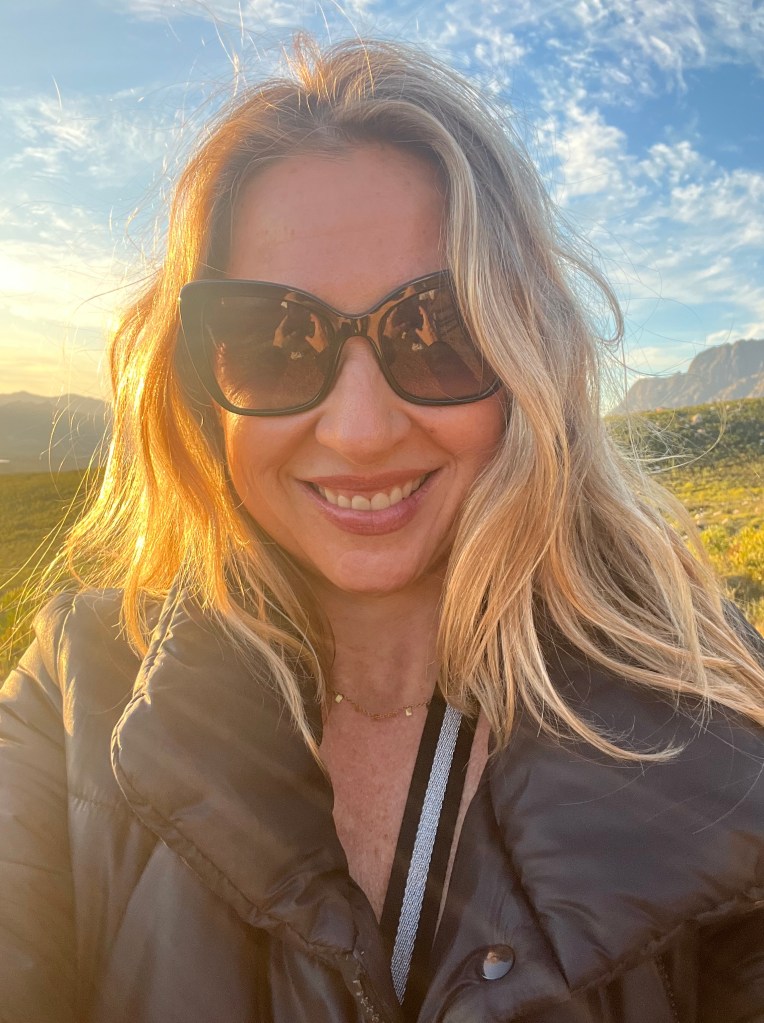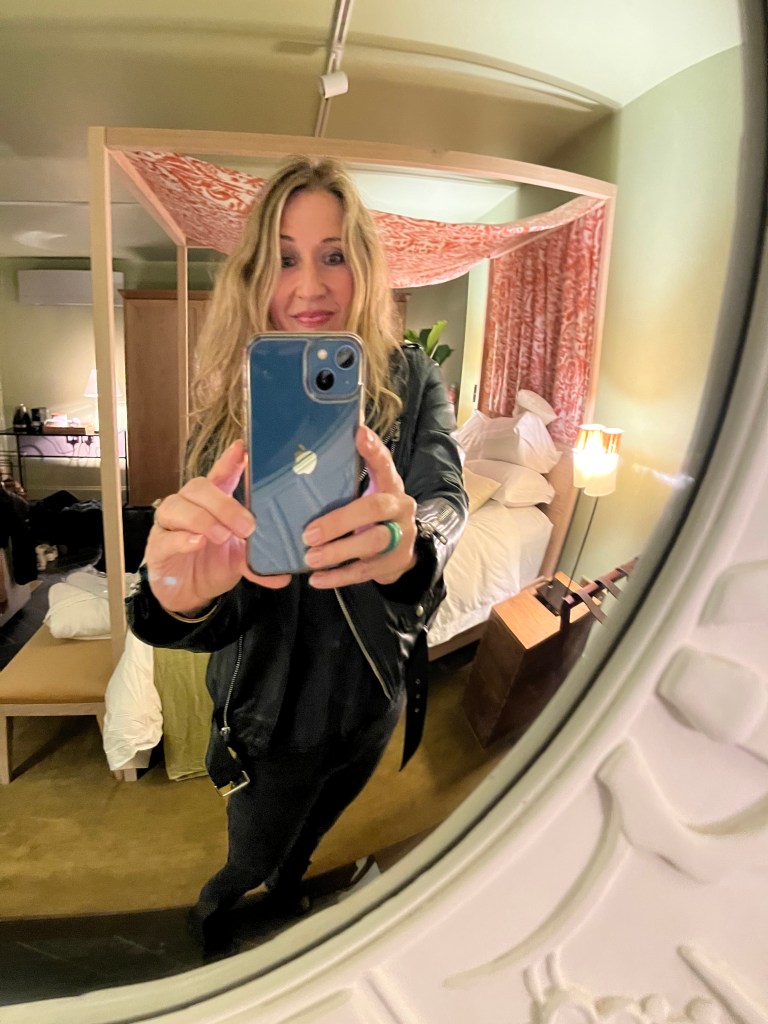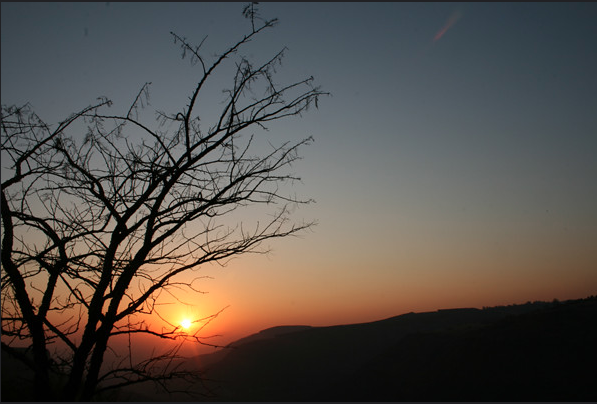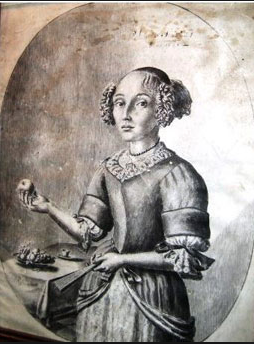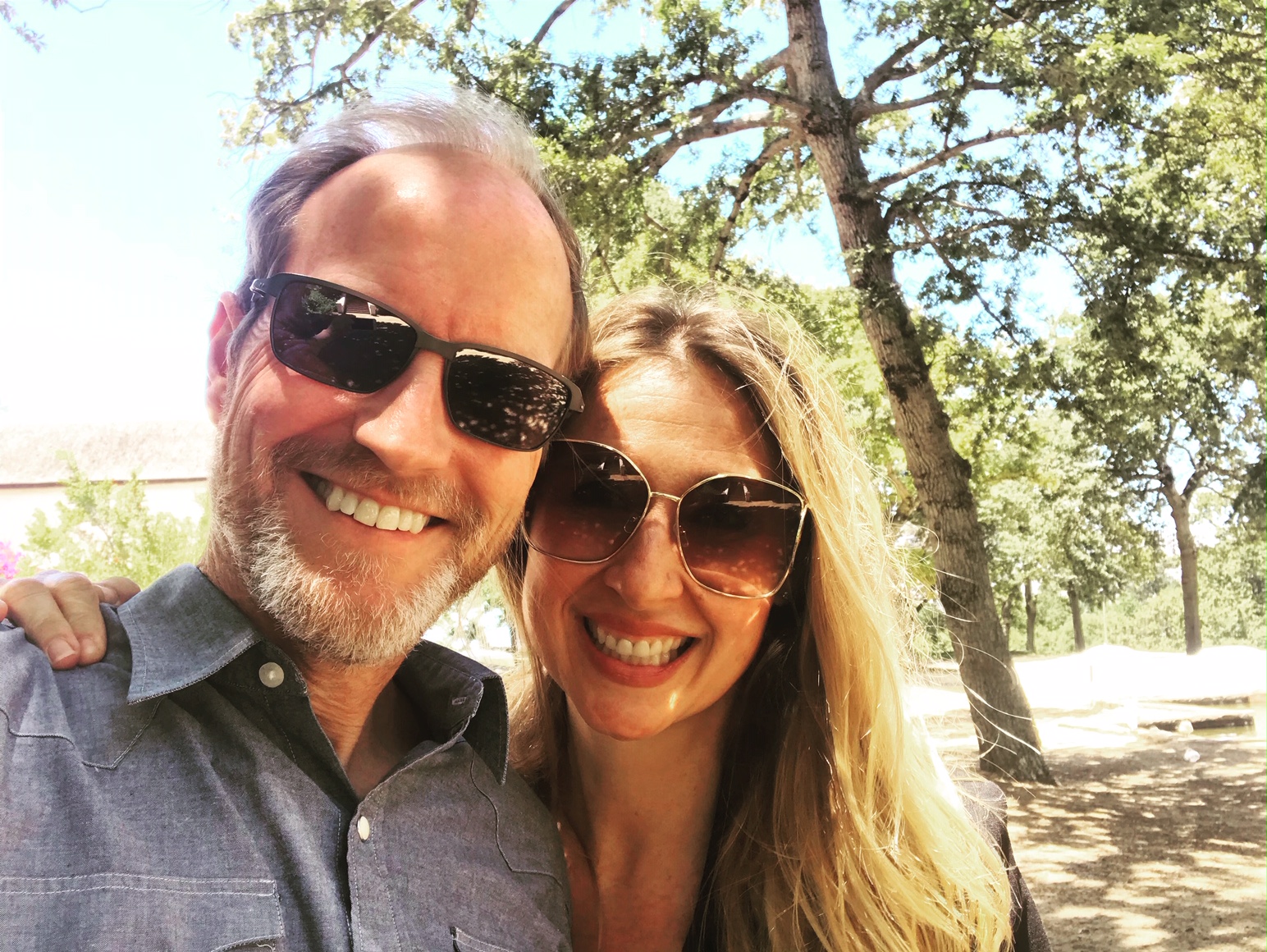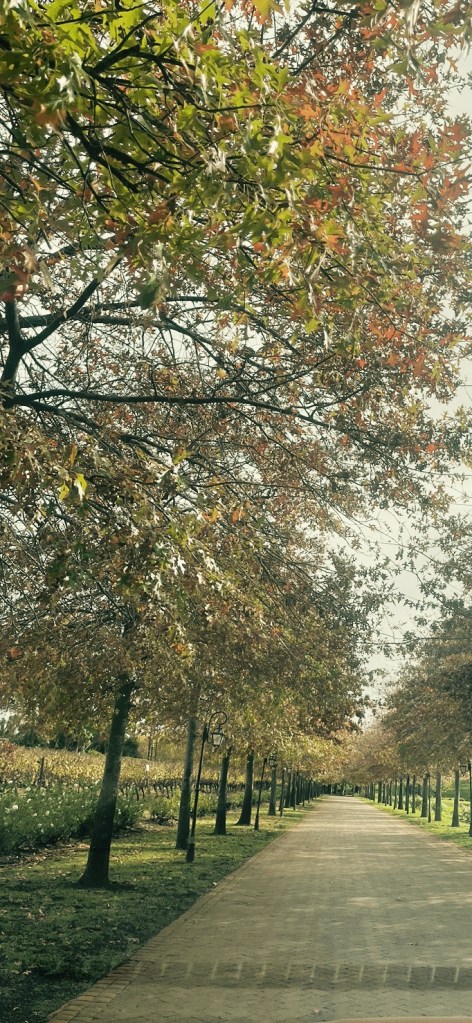
When you walk in and they’re waiting with a warm towel to wipe your handies after the travails of your journey from the big city 40 mins away and also they hand you a glass of Shiraz (at 11am) you know you’re in the right place. Asara means hope and you do, indeed, feel more hopeful than you have in a while when they usher you into your suite with its comfy lounge, bathroom the size of a conference centre and balcony with pink mountain views and manicured lawns for days. Not to mention a glowing David Hockney-esque pool resplendent in cobalt blue which you share with a solitary Hadeda while the sun hunkers down for the night.
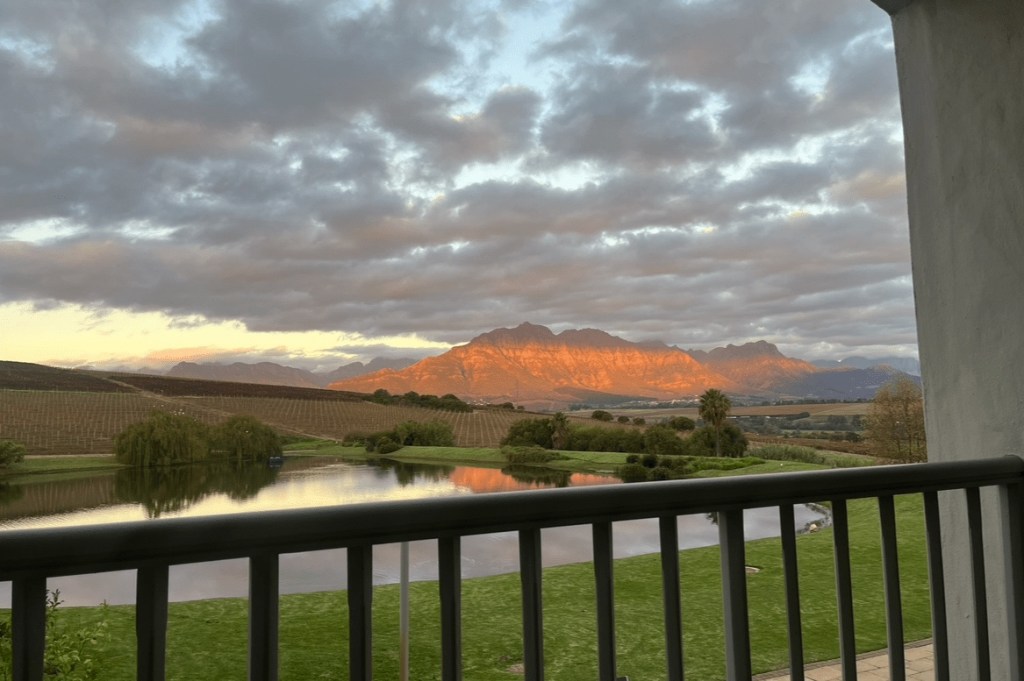
Autumn in the winelands is the Western Cape’s best kept secret: fires crackle and fiery-coloured leaves crackle underfoot. Mostly the sun still shines, but softly and politely. You want to be outside all day long and then, when the dusk chill settles, it’s delicious to huddle indoors, wrap yourself up, drink more of that Shiraz and eat hearty, nourishing dishes of lamb and beef and venison on whipped potatoes prepared with an outrageous ratio of butter to starch. These are the days of creamy carbs, of winds chasing slate-grey clouds, of thunderous rain showers and vineyards shining brightly in the last hours of the afternoon; of early nights and early mornings, crisp linen and dark, strong coffee. And if you can spend these hours with a friend or two; folk whose faces are as known to you as your own, in a place that feels safe and familiar even if you’ve never been there before, life becomes imminently gentler.
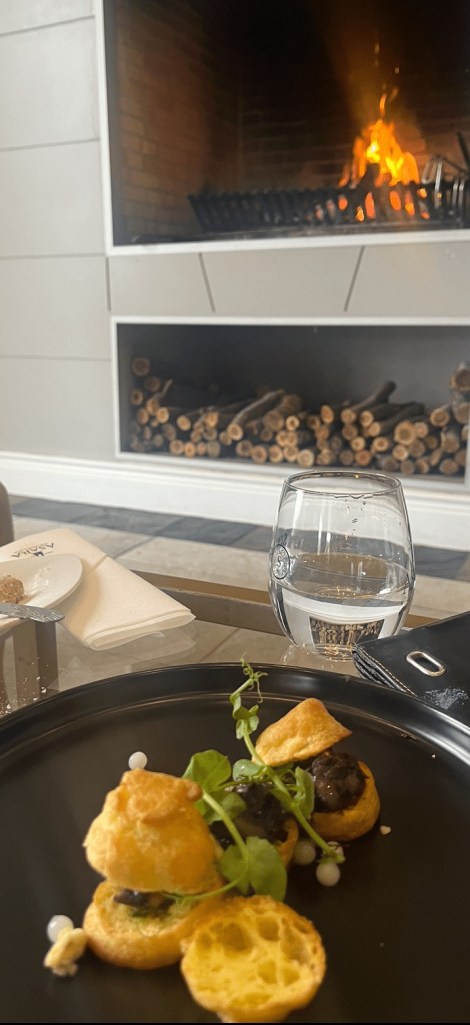
As we age, old friends become rare as jewels: people who knew you when. In this case, the when was me as an awkward 15-year-old in an ugly, maroon uniform boarding the school bus, nervously looking for an empty seat near the back because the front seats were for the misfits which I believed myself to be but didn’t want to be seen as such. No seats to be had. A split second of panic. And then the cool boy, the good looking one people wanted to be friends with, who smokes openly at break and rides horses and looks a bit like Dave Gahan, beckons me to share his seat. He puts his bag on the floor to make space. This small gesture of kindness that happened amongst zillions of gestures in those deeply impressionable and angst-filled years stays with me. That horrible government school run by thick-skulled sadists who did everything to crush the spirits of kids like him and I, creative little humans, visionaries in our own small way. We gave them the middle finger, we did. We poured vodka into the Kool-Aid.

Even now, 40 years later, I don’t see him as him, who went on to achieve impressive fame and success in his chosen career, I see him as the older boy on the bus, ever grateful for that life-saving moment. Now we are here to visit with him, mainly, and for a brief respite from the relentlessness of life. We are seated in a tall, serene room on a comfortable couch and plied with cold champagne and pretty cocktails, and just when we’re starting to feel peckish, a polite young man shows up with enormous trays of beautifully articulated finger food: tuna sashimi; lamb on a stick; French onion soup in a thimble. There is beef broth, oysters, prawn tempura, brie melted deliciously in a grape preserve. More champagne later, plates carrying even more delectable things arrive: snails in soft choux pastry; tongue with Dauphine potatoes; peppery spaghetti tossed with cream and chicken sweetbreads. We eat and drink and are merry. L’chaim: to life, love and ourselves.

An old man with beautiful, snow white hair dressed immaculately in a lemon coloured sweater is positioned on a chair in front of the fire. He has either fallen asleep or died. The day is chilly and I want his seat, to watch the flames while we talk. I keep looking back at him, willing the undertakers to come but he sits on for an eternity.
The owner joins us for a chat. He is also a visionary; a straight talking straight man whose wrists are adorned in silver skulls and his manicured fingernails done in a pale pink gelish. I wonder what the farmers make of him. He doesn’t give a fuck. He also adds vodka to the Kool-Aid. He tells us about cigars, his passion, and his other passion, food – meat, hand-reared; homemade butter; bread he bakes himself using his own sourdough culture. It’s softer and lighter than any I’ve eaten. Every animal product consumed on the premises can be traced back to its source. He makes the jam and the marmalade himself from carefully selected organic fruit. Later we walk past a room with a cupboard glowing warmly in the gloomy afternoon. We look closer and see that the walls are huge, lit slabs of pink Himalayan salt curing the hanging meat.

My friend gives us a tour of the premises. We’re a little bit drunk and the high heels of my vintage Michael Kors boots are starting to rankle. His signature black coat flaps in the wind and even as we look out at the Helderberg mountain range, under whose craggy slopes we both grew up, I’m reminded of London in the eighties and Depeche Mode and The Cure and Yazoo, the music of our teenage years, dark smoky dance floors, Benson and Hedges Special Mild. Always trying to escape, break free, buck the system. And we did. We hated those teachers and we let them know it.

Now we need to sober up before dinner so we take a dip in the icy pool. I imagine this place in summer: an endless round of rainbow-coloured cocktails, fluffy white towels, luncheons under the trees. ‘A Dutch couple come every year and stay for 49 days,’ I am told. Why 49? I wonder. The hot bath, after the cold pool, burns like acid. The young chef joins us at dinner. My daughter is dating a chef. I worry aloud about the lonely Saturday nights that will come to define her life. We see into the future in ways our children cannot but I have to hold my tongue. She likes him, she is happy. The hotel is launching a new restaurant, a set menu using the animal nose to tail. Wasting nothing, pushing the boundaries of South African cuisine. It includes ambitious dishes like beef heart biltong and liver ice cream. His eyes shine with excitement. I see a young artist, a creator. I express doubts about the ice cream but he assures me it will be delicious. I promise him we’ll come back to try it.
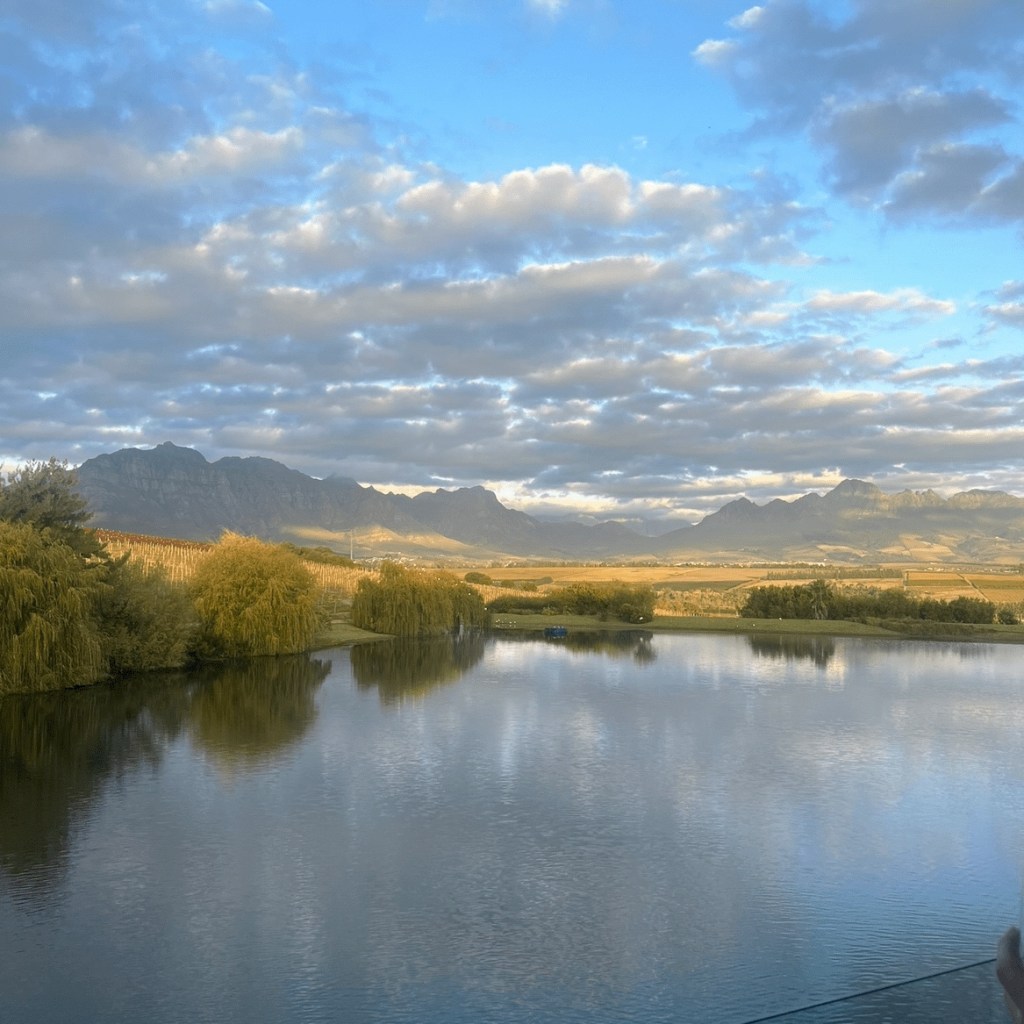
Later, in our room, I have a meltdown over the largeness of the pillows and the tightness of the sheet. In truth, everything is perfect and you can choose any damn pillow you want but I’m overstimulated, over-wined and need to lie down and sleep. My husband is used to this sort of malarkey and ignores me, as he should. In the morning the air is still and the mountains have changed colour. We are still far too full for breakfast so we eat everything on offer. I have to try the home-cured ham and special recipe marmalade. The Eggs Bennie is perfection, unctuous and velvety and glistening with homemade butter. I greedily eat it all. Barely an hour later they implore us to try the cinnamon buns with champagne and have some of their custom-made burgers but I cannot possibly eat or drink another thing till the following week or at least till we get home. The buns are gifted to us in a takeaway box.

My husband buys half the wine cellar, pretending it would be rude not to. People appear like magic fairies when it’s time to load the car. They whip our luggage out of our hands as if the very notion of us carrying a thing is beyond their comprehension. I like it here. They get a lot of things really right. In my next life when I’m not a writer maybe I’ll also come for 49 days. We drive down the tree- lined avenue headed home to laundry and a fridge that doesn’t stock itself (wtf). I’ve been listening to this song on repeat called Goodbye Horses. I read somewhere that when you do this, listen to a song over and over again, it’s a sign you might be on the autism spectrum. It would explain why I’ve always felt like an outsider; like I didn’t quite belong. I mean, it doesn’t matter, it’s a label, but sometimes it takes 50-odd years for us to figure out who and what we are and once you know you can be a little bit kinder and more forgiving of yourself and the many mistakes you have made.

A grey Sunday on the N2. Smoke hovers over the townships and Table Mountain is obscured by a thick blanket of clouds. Some youths kick a football about. Winter, where life gets more real. A cold front is headed our way, I read, and masses of rain. The townships become lakes but our house is high and dry. It’s a weird place we live in, so little and so much existing side by side, and all of us trying to figure it out. Trying to get by in our various circumstances. I’m grateful for love and I’m grateful for friendships that last a lifetime. No matter who and what we become in the end, deep down we remain 15, awkward kids on a bus hoping for a friendly face and for someone to offer their seat. Goodbye, horses, I’m flying over you.





